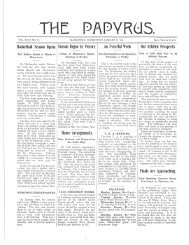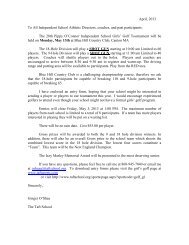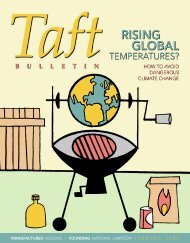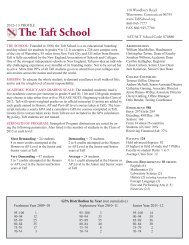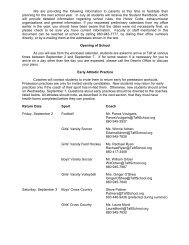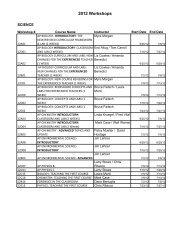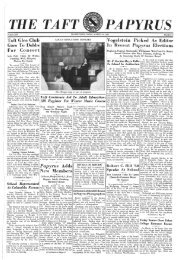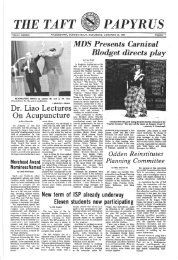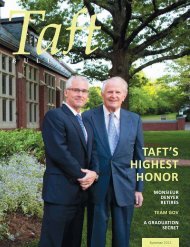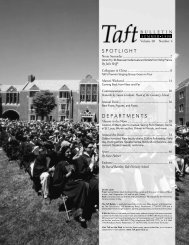Download - The Taft School
Download - The Taft School
Download - The Taft School
Create successful ePaper yourself
Turn your PDF publications into a flip-book with our unique Google optimized e-Paper software.
“I love to evaluate everyday procedures<br />
and find ways of making us more productive.”<br />
Second, he said, is efficiency. “I’ve always<br />
been a systems guy,” Thompson said. “I love to<br />
evaluate everyday procedures and find ways of<br />
making us more productive. For instance, we<br />
have built so many great tech resources here,<br />
but they are hard to find. I like to build technological<br />
tools that streamline age-old procedures<br />
and bring resources together.”<br />
<strong>The</strong> information system that <strong>Taft</strong> inaugurated<br />
16 years ago “is a beast of a homemade<br />
application, that requires a lot of manual intervention,<br />
even for simple tasks,” he said. “Over<br />
the years, they’ve been patching and bandaging<br />
it instead of zooming out and searching for<br />
something off the shelf that might have features<br />
we’ve never even imagined. That way we benefit<br />
from what other schools do.”<br />
Finally, and most critically for Thompson,<br />
is getting classroom teachers to buy in to new<br />
ways of instruction by harnessing the technology<br />
tools available. Increasingly, he says, “the<br />
sage on the stage” method of teaching is becoming<br />
obsolete, in many ways a victim of a wired<br />
generation that does not have the attention span<br />
of its predecessors. Acknowledging that today’s<br />
students are wedded to technology means understanding<br />
that the process of scholarship is<br />
vastly different today.<br />
“Kids are learning very differently now,”<br />
says Thompson, who says he is in many ways<br />
an old school teacher who happens to be agile<br />
with new school tools. “For better or for worse,<br />
because of the introduction of technology into<br />
kids’ lives, they’ve become more dependent on<br />
it,” he says. “It shrinks their attention spans, so if<br />
things aren’t as zippy, or more interactive, they<br />
are not as engaged.”<br />
That means getting classroom teachers to<br />
embrace technology in a way that gets students<br />
to think critically, question the technology on<br />
which they have been weaned and come up<br />
with innovative conclusions.<br />
<strong>The</strong> current generation has grown up in a<br />
time when, Thompson says, “all information is<br />
at your fingertips and searchable.” Consequently,<br />
he believes teachers must help students navigate<br />
through the technology to help them acquire<br />
information, question authority and pinpoint<br />
the most reliable sources. “We need to teach<br />
kids how to utilize the internet for intellectual<br />
pursuits,” says Thompson. “Our task as educators<br />
is now to ask kids the right questions, and<br />
tell them to ‘Have at it.’ <strong>The</strong>n the students collaborate<br />
to find, evaluate and scrutinize sources,<br />
understanding that Wikipedia isn’t always fact,<br />
as they work to create or publish their answer.<br />
Our goal is to enable kids to be better critical<br />
thinkers.” But even as Thompson promotes<br />
critical thinking skills, he hedges. He says that<br />
as much as he embraces technology, he is a fundamentalist<br />
learner at heart. He worries that an<br />
overreliance on critical thinking may encourage<br />
analytical and imaginative ideas, but it also may<br />
leave students without the foundational principles<br />
upon which those ideas take flight.<br />
Countries that encourage a disciplined, rote<br />
pedagogy may lack the creative impulse or ingenuity<br />
to create new avenues of growth. But their<br />
reliance on fundamentals allows them the concrete<br />
knowledge to get the job done. “As much<br />
as I’m a fan of using technology to have kids<br />
find solutions, I worry about creating a society<br />
of only abstract thinkers. I think they miss a lot<br />
of important information that comes from the<br />
fundamentals. Kids aren’t taught to pay as close<br />
attention to detail as in past generations.<br />
“<strong>The</strong>re must be a happy middle ground. I’m<br />
appalled, for instance, at students’ lack of attention<br />
to grammar. Oh, it just kills me.” he says.<br />
Dubious of the idea of ditching the memorization<br />
of multiplication tables when any number<br />
of computational tools will more expeditiously<br />
provide answers, he is a steadfast believer in a<br />
firm grounding in the basics.<br />
In part, that comes from Thompson’s own<br />
background, spending long avenues of time<br />
alone, teaching himself the fundamentals of<br />
learning. A single child, raised by a single mother<br />
who worked as a registered nurse, Thompson<br />
says he was a ‘latchkey kid,’ returning dutifully<br />
34 <strong>Taft</strong> Bulletin Winter 2012



